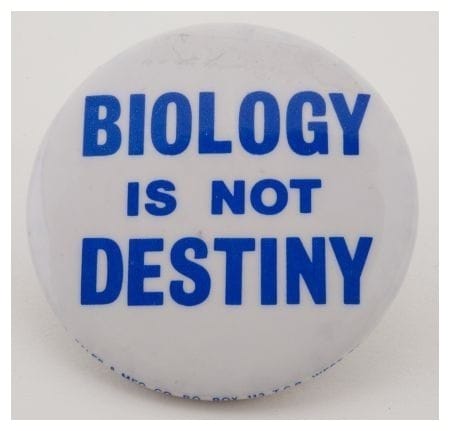Is Sex Real and Natural?
And why that’s a really tiresome debate
The "natural kinds" philosophy Twitter debate around the existence or non-existence of a binary classification for human beings around reproduction is profoundly annoying.
I’m frustrated with the "sex is a natural kind" side. They foolishly throw around population ideas around sex being a bimodal cluster concept with only two kinds and jump to a claim that every human being fits immutably into one of the two, while refusing the obvious knowledge of ambiguity in population data and that modifying such traits that make the clusters up is the fundamental observable natural reality of transition. They also routinely ignore that such observations at a population scale lose meaningful information as you change your scale to the individual , a single data point within the population. They also ignore that choosing to talk about various groups within the whole changes your frame of reference, in the same way that gerrymandering does, creating a perspective where the bimodal population observation is no longer rational over your observed sample group.
In return, the (broadly pro-trans) philosophers of science annoyingly respond that there are no defensible natural kinds at all as a result of this existence of localised or sampled ambiguity. I actually respect that this comes across as disingenuous to gender critical groups and some scientists who can see that in nature there is a system which has biased outputs and these outputs are biased towards two particular poles, because the binary combination of samples from different poles, in nature, is more likely to reproduce itself.
Essentially I'm really unhappy with both sides of the philosophical debate.
Obviously also those proposed natural kinds do not preexist humanity as it is now in some historical sense. They exist as a pattern over and outside of individual human beings. They are observed from the perspective of surveying a population of humans. You can argue that this is an artefact of the scientific perspective but I think all observation of the natural world has a perspective it is being observed from and the important thing is that we recognise we observe nature (assuming nature exists) from ours with all our flaws and limitations (some of which we are unaware of so we should tread carefully and be amenable to information from others).
So in some sense, there often can be an element of nature and biology denial in pretending that there are no natural systems which we can make coherent observations about verifiable by others. In one sense we can say that our observational powers are limited. But in another it’s a very boring universe if we abandon the idea that we are able to observe it at all. It is lacking nuance about how we derive knowledge in practice.
That is not to yield everything to the GC philosophers. They are deeply wrong to insist on subjecting trans people to their preferred ontology and confuse their preference with objectivity whether natural kinds exist or not. There’s an epistemic injustice in doing violence to others over a difference in experience and belief/knowledge. I think epistemic injustice is a huge part of what GCs are up to, it’s why I commit so much time to documenting the harm transphobes are doing to trans people publicly in order to force trans suffering into the social knowledge.
The Gender Critical philosopher will raise ideas that require a population perspective observation and then refused to acknowledge the decoherence of those concepts at an individual scale. If you want to imagine what this decoherence looks like try looking at a picture on a television screen and then try to understand what you’re looking at again through a magnifying glass looking at only one pixel. The picture is a product of the system of pixels relative to each other. It is not coherently a picture anymore at the scale of its unitary elements. The same is true of our models of sex in nature and their relevance to understanding relations between members of our species, rather than inherent clear meaning in any particular individual beings themself.
This is really the same complaint that we should bring about the idea of bodies that don’t produce gametes being claimed by Gender Critical philosophers to be "organised to produce gametes of a particular kind" . That concept is clearly only meaningful by similarity to a reference object from our earlier knowledge of bodies which do produce those gametes. And at the same time that reference to similarity in previously observed bodies is linked into the conversion while ignoring other similarities to other bodies — we are told that one sort of similarity is cosmetic or aesthetic but superficial (despite eg manifest differences in health outcomes for trans bodies) while another difference is meaningful. This is not a natural selection of similarities having meaning but an ideological one. As a potential other choice of similarity Andrea Dworkin famously talked about understanding how “That information [from the knowledge of transsexuals existing] threatens to transform the traditional biology of sex difference into the radical biology of sex similarity. That is not to say that there is one sex, but that there are many.” Nature exists but political activity attempts to emphasise features of it to the advantage of the powerful. Radical movements will also attempt to emphasise similarities in radical liberatory ways.
As an aside to this I think this is a really good reason as to why debate doesn’t work. The pro trans philosophy of science position has co-evolved on Twitter and elsewhere with the TERF position, each shaping the other into its own worthless but neatly, inversely conforming shape to its partner in conflict. Each is unsuited to the goal for attaining greater knowledge.
Philosophy of science is important to cut through false claims about trans people and natural kinds drawn from the wider human population being a coherent or feasible way to specifically address questions regarding trans people — a population who in nature move in ambiguous ways far more than the wider population norms which sex emerges from. But again, I think taking a fresh look at the situation with respect to those approaches to classifying trans people within a sex classification system would require pointing out first and foremost, trans people are an exceptionally bad population to classify in the traditional way. Even conceding the existence of two broad natural cluster types over humans, it’s clear that there is a shift in observational frame when looking at trans people, and that observational frame radically alters useful information we might derive from biological and social sex.
Instead we absolutely can say, recognise, and observe:
That the GC movement is a movement broadly organised around the erasure of perspectives which tender trans people a familiar observable co-existence. And this philosophy of sex question is no different.
Sheila Jeffreys says that "transgenderism" arose out is male power structures, starting with Victorian sexologists, through sexist and often homophobic doctors in the 50s and 60s through to present day. That as an artefact it was shaped into existing as it does through patriarchal homophobic medical, legal and social practices. And the thing we do not usually recognise is that she is right. But this is sad, because we refuse ourselves in doing so from the equivalent insight that Sheila Jeffreys, an Australian, is a construct of patriarchal white supremacist colonialism. Sheila Jeffreys would simply not exist without it. Were we not so focused on rebutting her narrow point, we could more easily observe that there is a preference here for frames of reference which delegitimise trans people and tend to naturalise the perspectives of the broadly dominant transphobic narrative. That’s why I say this is about epistemic injustice.
Because Sheila Jeffreys will often refuse the existence of trans life (defining trans loosely here so as to have a concept that survives time travel as “living by preference a cross gender life, permanently or very long term") before Havelock Ellis. And like the conversion therapist she will always find some first transsexual and then a historical first cause she will give to explain why that transsexual and others after them appeared. Anything to avoid acknowledging a more prosaic view that human diversity has produced self aware human beings with a sense of sexual identity and orientation towards others, but that this development process only has to be effective in creating identities that tend to mate most of the time and is otherwise a broadly chaotic and undirected system. There’s not a single one of us which is not a construct of and within the patriarchy, but she chooses to use that as an epithet against trans people in particular and that is something we can and should call out. Sheila Jeffreys choices create the conditions such that gender becomes (as Polish feminist Agnieszka Graff puts it) a man in a dress, rather than a system for understanding social attitudes to sex.
Seen as a feature of nature’s messiness, a margin note to the wider system of reproduction and evolution, the fact of trans people existing in small numbers that slightly confound system level observations about the human species is not an especially surprising or troubling appearance to science (and our history lends weight to this too).


